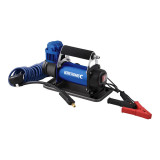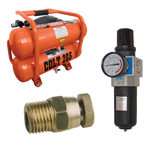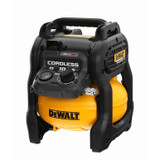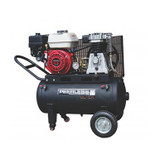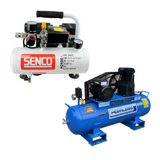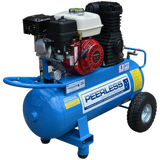This piece of gear converts power into kinetic energy by compressing and pressurising air, then blasting this compressed air out at high pressure. It’s great for inflating tyres, or operating pneumatic tools like nail guns, impact wrenches, sanders, and paint sprayers, just to name a few.
Being hugely versatile machines, you’ll find the good old air compressor on industrial sites like construction jobs, the mechanics yard, carpentry workshops, hard at work at your local party store or in pride of place in the home shed. So whether you're on the worksite or tackling a DIY project at home, a top-notch workshop air compressor is your best mate.
What do you need to know when buying an air compressor?
Before you rush off and just grab the first air compressor you see, you need to think about what you’ll be using it for. It’s essential that the psi your tools need is a true match with the air pressure output of the compressor.
Next you’ll want to look at tank size, and whether it’s easy enough to cart around. A small air compressor might fit the bill if you’re using it for quick tasks, but if you're using tools that need a constant flow of air for a long time, you'll want a bigger tank to keep things running smoothly.
And don't forget about the pressure cycle and duty cycle—you want a compressor that can handle the hard yards without packing it in after five minutes. If you're not sure where to start, come chat to the Tool Kit Depot team for the lowdown on pumping things up.
Can an air compressor fill a car tyre?
You betcha! Not only will you spot them humming away in every automotive workshop around, but any hardcore off-roader knows that packing an air compressor to 4WD is an essential piece of kit. Dropping your tyre pressure so you don’t get bogged in the sand or mud, or blowout a tyre rock climbing is a no-brainer when you’re on an off-road adventure. But once you hit the bitumen, those flat tyres run the risk of punctures and the next servo could be a fair hike away!
This is where having a 12 volt portable air compressor comes into its own, getting those tyres road-ready and back on track in a flash. For standard tyres on a car, an air compressor that's small to medium size will do the job, but for big rigs with beefy tyres you’ll need bigger units, unless you like standing around for what feels like forever.
What is the best make of air compressor?
When you’re on the hunt for the best air compressor for the job at hand, Tool Kit Depot has your back with the cream of the crop in the air compressor biz.
Whether you’re after a Kincrome air compressor, Senco air compressor, Peerless air compressors, or a unit from Arico, Full Boar or Millers Fall, we stock the brands you can trust to get the job done right. So why settle for anything less? Come on down to Tool Kit Depot and snag yourself the best air compressor to pump it up and get the job done—your ultimate stop for all things compressed air!
What is a direct drive air compressor?
They all compress air, but what sets a direct drive air compressor apart from other types of air compressors is that there are no belts or pulley system. The motor of a direct drive compressor is directly connected to the air pump via a crankshaft. This means that the air pump rotates at the same speed as the motor, so the airflow (CFM) is directly determined by the motor speed (RPM).
Direct drive air compressors are beasts at the long game when you have jobs that require continuous grunt for extended periods of time, such as construction jackhammering.
Which is better, belt drive vs direct drive air compressor?
In the battle of direct drive vs belt drive air compressor, which is better depends on what you’re going to be using it for, as each has its own unique strengths. For jobs that need long lasting, continuous heavy industrial machinery, a direct drive is the way to go. They’re also a great choice when you’re operating in harsh environments with extreme temperatures—both below freezing and up to 40 degrees. Smaller and more compact and with less moving parts also means less wear and tear as well as less maintenance required and generally a longer lifespan of the unit, which is another great benefit.
Belt driven air compressors on the other hand are a top choice for those jobs that need more grunt, or that call for the flexibility to change air pressure to suit different tools. They’re ideal for automotive applications and woodworking, are less noisy, and easier on the wallet for the initial outlay.






